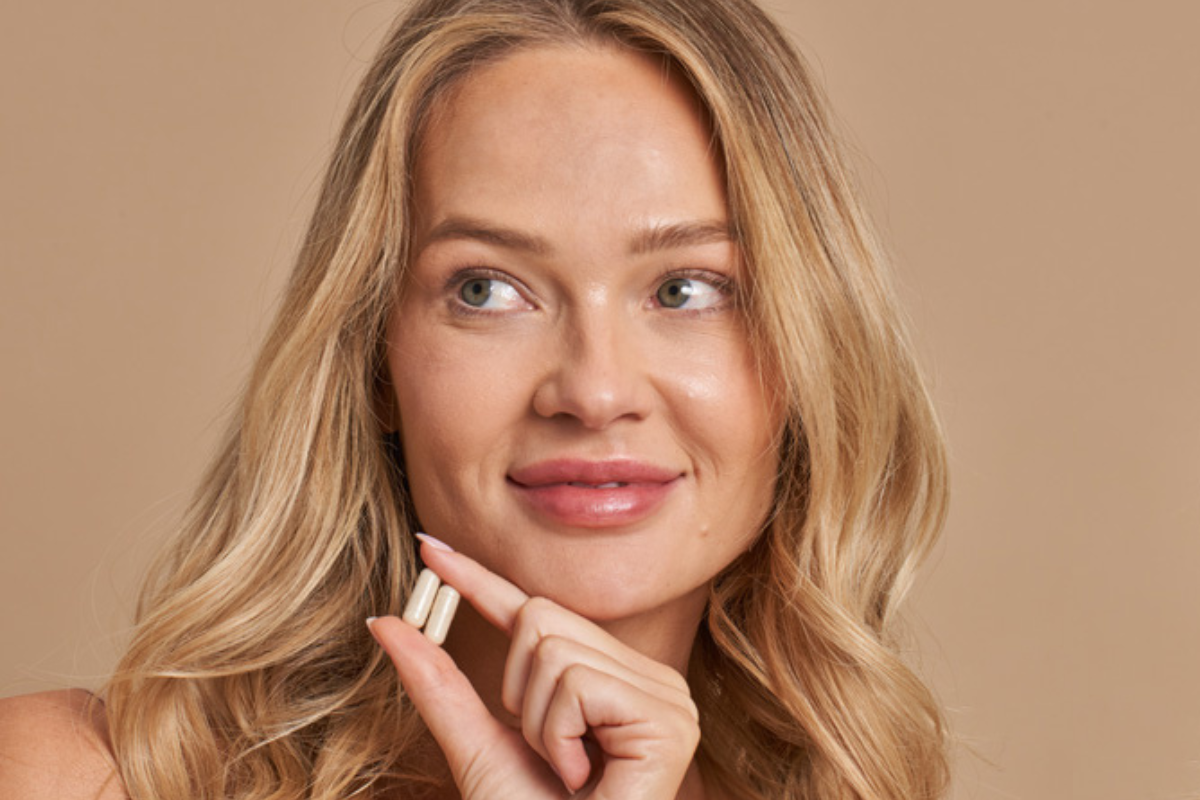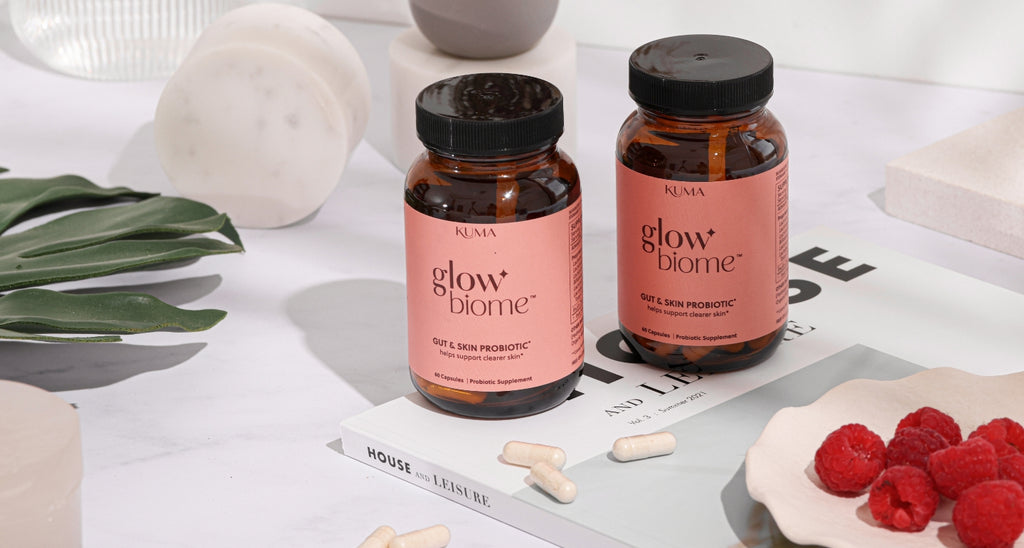acne root causes
Can Probiotics Cause Breakouts? Here’s What You Need to Know
Of the current studies looking at probiotics and acne, there is no evidence to suggest probiotics trigger acne. On the contrary, many have found probiotics to improve acne and other skin concerns. However, this doesn’t mean that an initial breakout period is totally out of the question. Here is why and what to expect.

Of the current studies looking at probiotics and acne, there is no evidence to suggest probiotics trigger acne. On the contrary, many have found probiotics to improve acne and other skin concerns. However, this doesn’t mean that an initial breakout period is totally out of the question. Here is why and what to expect.
If you have acne-prone skin, you might be nervous about adding a probiotic supplement to your routine. Here’s the thing: certain probiotics have been shown to help improve acne-prone skin. That said, anyone who has experienced an acne purge after changing something in their routine might (understandably!) feel uneasy about switching things up.
So can probiotics cause breakouts? The short answer is no…but there is a bit of nuance that needs to be explored. Let’s talk about how probiotics affect acne-prone skin, and what you need to look for when choosing a probiotic supplement that will best serve your complexion’s unique needs.
The Connection Between Acne and Gut Health

There is a close-knit relationship between the gut and the skin – especially when it comes to breakouts.
A healthy gut can be characterized by a gut microbiome that is home to a diverse community of microorganisms, including good bacteria strains. An imbalance in this system can affect your overall health in a variety of ways. When it comes to the skin, this can look like an increase in acne breakouts.
Research has shown that people dealing with acne often have lower levels of good bacteria strains (including Lactobacillus and Bifidobacteria) in their gut microbiome. Additionally, studies have shown that patients battling breakouts tend to have less microorganism diversity in their gut, and a general gut imbalance when compared to a control group. In short, if you’re dealing with acne, there’s a chance your gut microbiome may be partially to blame.
How Probiotics Affect Acne-Prone Skin
Probiotic supplements are designed to deliver more good bacteria to the gut, strengthening the community of microorganisms for optimal gut health. So how exactly do these supplements affect acne-prone skin?
By increasing the levels of good bacteria and improving microorganism diversity, probiotic supplements can get to the root cause, working to tackle acne from within. In fact, supplementation with specific probiotics has been shown to help minimize acne breakouts for a blemish-free complexion.
Take for example a study in which acne-prone participants took a supplement with bacteria strain Lactobacillus rhamnosus SP1 for 12 weeks. At the end of the study, researchers found that this supplementation reduced acne for 80% of the participants. They believed this visible improvement is tied to the way Lactobacillus rhamnosus SP1 affects insulin-like growth factor 1 (or IGF-1), a hormone that can increase the production of sebum and raise inflammation levels. Both of these factors can be problematic for acne-prone skin.
By the way, the benefits of taking probiotics for the skin don’t end with acne. Research has shown that the right probiotics can also support a stronger skin barrier and improve skin dryness – all of which is important for achieving not just clear, but also healthy, comfortable skin.
For example, Lactobacillus paracasei has been shown to enhance skin barrier recovery and decrease sensitivity in the skin. Additional research has revealed that specific probiotic strains (including Lactobacillus acidophilus, Lactobacillus rhamnosus, and Lactobacillus plantarum) can work to improve the skin’s hydration levels from within. Put simply, the right probiotics can improve gut health to not only quell breakouts, but also maintain a supple, glowy complexion.
Can Probiotics Cause Breakouts?
With all of that said, it seems like the answer is clear: probiotics shouldn’t cause breakouts. In all major studies looking at gut health and acne, there is no evidence that points to probiotics triggering acne. In fact, as we’ve seen in the research highlighted above, these studies have shown the exact opposite!
Here’s the thing: this doesn’t mean that an initial breakout period is totally out of the question. You still may experience some purging – and there’s a good explanation as to why.
When introducing these probiotics to your microbiome, this can cause a temporary “turf war” between the current resident microbes and the new additions. This could manifest as temporary gut symptoms, such as an increase in bloating or loose stool, or potentially a flare in breakouts (induced by the changes in the gut). This shouldn’t last more than a few days to a few weeks.
We should also point out that studies analyzing the use of probiotic supplements for acne are typically looking at results starting around 4 to 6 weeks or even 12 weeks after patients start their new regimen. This means it is possible that researchers aren’t accounting for a small initial breakout period in the first few weeks after participants start taking probiotics.
With all of this in mind, while it’s possible probiotics might cause some initial purging at first, they shouldn't trigger ongoing breakouts. If you’re dealing with a potential probiotics acne purge after adding a supplement to your routine, stick with it for a few weeks. This reaction should clear up as your body adjusts to the new changes in the gut microbiome. If it does persist more than 2 weeks, this may be a sign you’re not taking the right probiotics for your unique gut microbiome, and they should be stopped and you should consult with a doctor for more personalized guidance.
Taking Probiotics for Acne: How to Choose the Right Formula

Think about your process of choosing a new topical formula. Even if you aren’t a self-proclaimed skincare expert, you probably do a bit of basic research to verify the product you’re about to buy will actually do what it’s supposed to do. You might make sure it has effective, science-backed ingredients and a solid formula that will actually help you target your concerns, or take a look at clinical trial results.
When it comes to choosing a probiotic supplement for acne, you need to take the same thoughtful approach. After all, if you want visible results, a high-quality supplement is what you need!
If choosing the right probiotic sounds overwhelming, don’t panic. You just need to keep a few key factors in mind to ensure you’re picking the best possible probiotic for your skin and overall health.
Consider the Probiotic Strains and Diversity
First up: you’re going to want to make sure the supplement you choose has a diverse range of probiotic strains. As we talked about above, acne patients tend to have less diversity in their microbiome when compared to those with clear skin. With that in mind, it’s no surprise that researchers have found supplements with multiple strains to be more effective than single strain formulas. This means a one or two strain supplement isn’t going to cut it! The highest quality probiotic supplements will have at least five strains.
You should also be mindful of the specific bacteria strains used in the formula. There certainly is no shortage of probiotic supplements on the market, but the issue is that very little of these are specifically formulated with the skin in mind. This means that, while a certain supplement may contain effective probiotics, it may not have the optimal strains for tackling acne and promoting overall skin health.
If a probiotic that supports the skin from within is what you’re after, look for a formula that contains strains that have been specifically studied for their effects on the skin (like the strains mentioned above, including L. rhamnosus SP1, L. Acidophhilus, L. plantarum, and L. paracasei).
Look for Prebiotics
Prebiotics don’t get as much attention as probiotics, but they are equally as important. They are essentially food for the probiotics in your gut, as they help these bacteria colonize and thrive.
Inulin (which can be found in sources like chicory root, asparagus, and garlic) is an effective prebiotic often added to probiotic formulas. Other examples of prebiotic-rich ingredients include potato starch, acacia fiber, dandelion greens, artichokes, and onions.
Check for A Clinical Trial
When choosing a probiotic, you need to do a little digging and look beyond the marketing claims. If you’re going to invest in a supplement, make sure the company is investing in the science of their products. To see if the formula actually works, look for brands that send their finished product out to be tested by an independent, third-party lab in a human clinical trial. Very few supplement companies do this, but those that do are serious about the potency and efficacy of their products.
Read the Fine Print
With probiotic supplements in particular, some use a sneaky tactic to make you think you are getting more probiotics than you actually are. The CFU number written on the front often refers to the dosage amount of probiotics put into the capsule at time of manufacture, but doesn’t necessarily reflect the amount you’re actually getting.
You will see this as a tiny asterisk next to the CFU, with accompanying text that says “*At time of manufacture” somewhere in the fine print.
Probiotics are living organisms, and some will die off during the manufacturing process, and simply over time, with exposure to light, heat, and air. You may want to look for manufacturers who are more transparent, and provide the number of CFU expected at time of expiry, helping to ensure you get the efficacious dose all the way through the product’s shelf-life.
For example, at Kuma, we publish the third-party Certificate of Analysis for every batch, so you can see for yourself, at time of manufacture for Glow Biome, we put in more than double (35 Billion CFU) the number of probiotics that is written on the bottle (15 Billion CFU) . The clinically efficacious dose is 15 Billion CFU, so we want to ensure you get at least this dose throughout the product’s entire shelf-life.
Confirm Third-Party Testing
As a final note, it’s best to stick with a company that verifies the purity of their product through third-party testing. After all, no one wants to take a health supplement with a Prop 65 warning on it, indicating there are high heavy metals in the product!
Very few companies publish a third-party Certificate of Analysis to verify purity and potency. Here at Kuma, we publish it for every batch, as we believe in complete transparency.
You’ll also want to make sure they produce their products in a NSF-certified or GMP-certified facility. In short, this certification ensures their manufacturing process and final product meets strict standards in regards to safety.
Glow Biome: Your Key to Unlocking Clear Skin from Within

If you’re searching for the ultimate skin-clearing probiotic, Glow Biome – a probiotic specifically made to transform the skin from within – is your perfect match. The daily supplement is made with six clinically validated probiotic strains, and is clinically tested to fight breakouts, increase hydration, and balance oil. Plus, it also offers the traditional benefits you’d expect from a high-quality probiotic supplement, including improved digestion and bloating.
What makes Glow Biome such a game changer for the complexion is that it has been carefully crafted with the best probiotic strains for the skin, including Lactobacillus paracasei, Lactobacillus acidophilus, Lactobacillus rhamnosus, and Lactobacillus plantarum. It’s also the first and only probiotic made with Lactobacillus rhamnosus SP1! These strains are paired with inulin from chicory root for added prebiotic support.
Glow Biome is produced in an NSF-certified facility, and each batch is tested by an independent third-party to verify the purity and potency. You can feel confident that you're getting the best quality formula – and that it actually contains what it says on the label!
When Will You Start to See Skin Benefits from Taking a Probiotic?
As you probably already know, there’s (sadly) no “quick fix” for acne – and that’s true of probiotics. Changes in the skin will only appear after the probiotics start to influence the gut. This means that you shouldn’t expect to see results in your complexion for at least a few weeks.
In the case of Glow Biome, the clinical trial results show that participants saw optimal results after 12 weeks. This included less severe and less frequent breakouts, a decrease in excess oil, and an increase in skin hydration levels. That said, most participants saw visible improvements in the complexion in just 6 weeks.